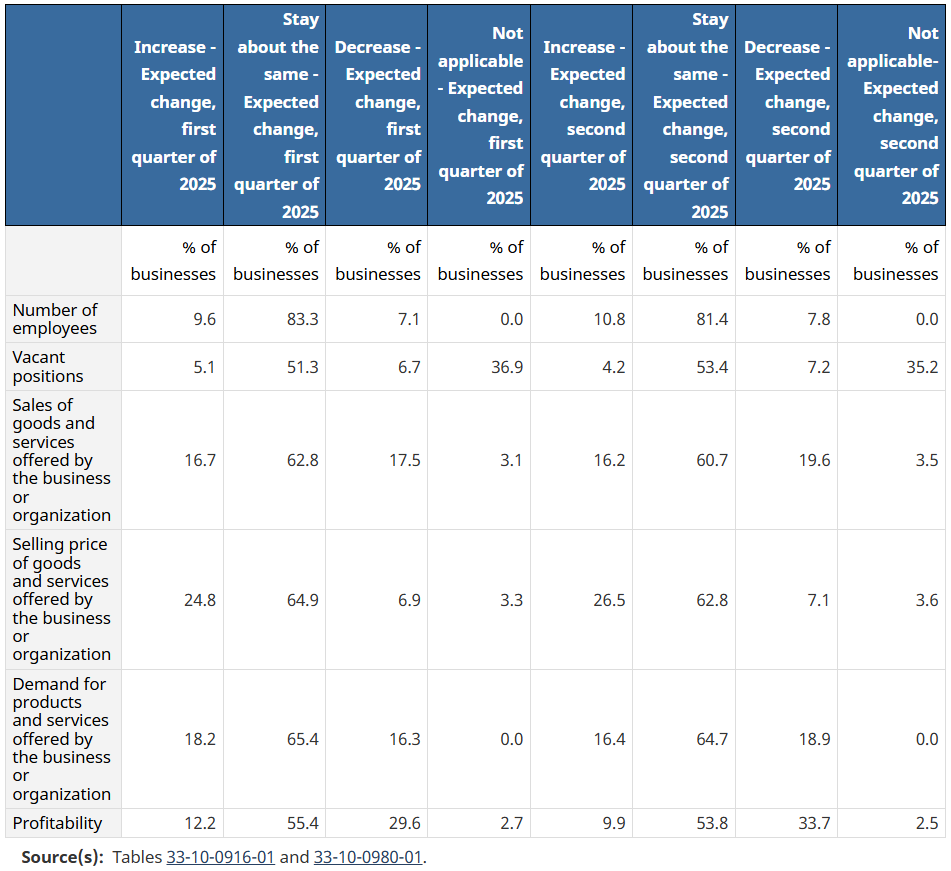
‘Businesses continue to anticipate a variety of obstacles over the next three months, mainly related to costs and labour’

Canadian employers’ business confidence has declined amid mounting economic pressures, according to a recent report from Statistics Canada (StatCan).
Business optimism has dropped to 70%, its lowest point since early 2024, as companies brace for ongoing challenges related to costs, labour, and international trade.
“Businesses continue to anticipate a variety of obstacles over the next three months (see Note to readers), mainly related to costs and labour,” says StatCan.
“Recent months have seen a rise in business uncertainty due to both the potential imposition and actual imposition of tariffs on Canadian goods and services imported by the United States.”
According to StatCan, 18.1% of all businesses—regardless of their level of trade activity—expect the U.S. tariffs to have a high impact on operations. The sectors most affected are:
Similarly, 18.5% of businesses expect significant impacts from Canada’s retaliatory tariffs on U.S. goods. The wholesale trade (37.1%), manufacturing (32.4%), and retail trade (32.1%) sectors appear particularly vulnerable.
About 7 in 10 SMBs are feeling the negative impact of US tariffs, according to a previous report from the Canadian Federation of Independent Business (CFIB).
Currently, 65.4% of Canadian businesses expect to face cost-related challenges in the second quarter of 2025—up slightly from 62.5% in Q1, according to the latest Canadian Survey on Business Conditions from StatCan.
Inflation remains the most cited issue, with 49.3% of employers naming it a key concern. This rises sharply in accommodation and food services (66.7%), arts and recreation (57.8%), and retail (57.3%).
The cost of inputs—including labour, energy, and raw materials—is the second-most anticipated obstacle, flagged by 27.7% of businesses. Among those, 61.9% specifically pointed to rising raw material costs, up from 44.3% in the previous quarter. The construction (87.4%), manufacturing (83.2%), and food services (73.3%) sectors are the hardest hit.
Labour shortages remain a persistent issue, with 35.0% of businesses anticipating related obstacles. Of those, nearly half (46.4%) expect managers to work increased hours—most notably in professional, scientific, and technical services (68.1%).
Additionally, 39.6% of businesses facing labour constraints expect those issues to hinder growth, particularly in manufacturing (55.0%). Workforce skill shortages were identified as the primary growth constraint by 15.5% of respondents, led by the construction industry (24.8%).
Looking ahead to Q2, just 10.8% of employers expect to increase headcount, while 7.8% anticipate a reduction.

While Canada’s real GDP rose by 1.6% year-over-year in February 2025 and consumer inflation slowed to 1.7% in April, employment levels remained stagnant. Only 7,400 jobs were added in April, and the national unemployment rate rose by 0.2 percentage points to 6.9%.
When asked to identify the main factor limiting growth, 26.0% of businesses point to high operational costs, according to StatCan. This concern is highest among firms in accommodation and food services (51.8%), arts and recreation (37.5%), and retail (36.2%).
At the same time, 20.0% of all businesses say reducing operating expenses is their top priority for the next year. Upskilling current staff is also on the agenda for 9.4% of businesses, particularly those in construction and technology-driven sectors.
Also, despite the increasing importance of digital infrastructure, 41.0% of businesses say they had not made any digital investments in the past three years and had no plans to do so. Among the key barriers, 20.2% cite the high cost of implementation, while 14.2% express uncertainty about the return on investment.
Over 2 in 5 (42.0%) businesses state that digital infrastructure was not relevant to their operations.
Many small businesses are eying operational adjustments amid U.S. tariffs, according to a previous report from First West Credit Union.
Amid the ongoing tariffs issue, an expert from KPMG is urging Canadian employers to rethink their approach to supply chain management.
“Every Canadian organisation affected needs to be building resiliency and agility right now,” said Alain Sawaya, National Leader of KPMG in Canada’s Supply Chain practice. That includes “looking holistically at their supply chain strategy and assessing their operating risks and contractual obligations – and alternatives – in this new trade environment.”